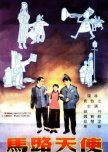This review may contain spoilers
"Who doesn't treasure life?"
Street Angel followed a group of low-income workers who forged bonds of love and friendship as they dealt with the hardships thrust upon them in an uncaring city of have and have-nots. Music, magic tricks, humor, and true love lightened the mood of a melodramatic story.
Xiao Hong and her sister Xiao Yun fled the Japanese and ended up in Shanghai working in a tea house. Xiao Hong sings for the customers while the owner put her older sister to work as a prostitute. Hong flirts with the trumpet player, Xiao Chen, who lives across the street with his friends. Their flirtation turns to love and all seems well until Hong discovers her new guardians intend to sell her to a wealthy street gangster. Chen and his friend Wang, visit a lawyer with an office high in a skyscraper only to discover that justice is out reach for the poor. C buddies The buddies spirit Hong away and the two lovers marry. Yun finds her sister and for a time it looks like the sisters may have a happy life. Sadly, the melodramatic aspect of this film could not be outrun as the economy worsens and rent prices increase, even worse, the tea house owner and the gangster are hot on their trail.
Music dominated much of the film. Zhou Xuan sang several lovely songs and enthusiastic trumpet music also livened the story's setting. Chen entertained Hong and his friends with numerous magic tricks to keep everyone's spirits up when money was tight. Zhou Xuan and Zhao Dan played their roles exuberantly and earnestly as the lovers went from frolicking to despair.
The quality of the filming was difficult to tell as the film I watched in the public domain had not been restored and could be quite blurry at times. Even at that, I could tell it was well framed and shot. This was one of the earliest Chinese films to use sound and they made the most of it with the background music and musical numbers.
Street Angel worked in humor that bordered on slapstick without going overboard. The love story felt authentic, even the second love story felt earned. The bright loving, parade-like atmosphere crashed into reality by the end of the film when the characters faced the harsh truth of their lives and limits of their power. Those who lived high above them had access to justice and medical care while they struggled to keep a roof over their heads and a smile on their faces. "Who doesn't treasure life?" Treasure life they might, but the poor toiled in a system that would swallow them whole if they weren't lucky. This plucky group of friends were a delight to watch as they held each other up and held on tight, even when it seemed their luck had ran out.
8/29/23
Xiao Hong and her sister Xiao Yun fled the Japanese and ended up in Shanghai working in a tea house. Xiao Hong sings for the customers while the owner put her older sister to work as a prostitute. Hong flirts with the trumpet player, Xiao Chen, who lives across the street with his friends. Their flirtation turns to love and all seems well until Hong discovers her new guardians intend to sell her to a wealthy street gangster. Chen and his friend Wang, visit a lawyer with an office high in a skyscraper only to discover that justice is out reach for the poor. C buddies The buddies spirit Hong away and the two lovers marry. Yun finds her sister and for a time it looks like the sisters may have a happy life. Sadly, the melodramatic aspect of this film could not be outrun as the economy worsens and rent prices increase, even worse, the tea house owner and the gangster are hot on their trail.
Music dominated much of the film. Zhou Xuan sang several lovely songs and enthusiastic trumpet music also livened the story's setting. Chen entertained Hong and his friends with numerous magic tricks to keep everyone's spirits up when money was tight. Zhou Xuan and Zhao Dan played their roles exuberantly and earnestly as the lovers went from frolicking to despair.
The quality of the filming was difficult to tell as the film I watched in the public domain had not been restored and could be quite blurry at times. Even at that, I could tell it was well framed and shot. This was one of the earliest Chinese films to use sound and they made the most of it with the background music and musical numbers.
Street Angel worked in humor that bordered on slapstick without going overboard. The love story felt authentic, even the second love story felt earned. The bright loving, parade-like atmosphere crashed into reality by the end of the film when the characters faced the harsh truth of their lives and limits of their power. Those who lived high above them had access to justice and medical care while they struggled to keep a roof over their heads and a smile on their faces. "Who doesn't treasure life?" Treasure life they might, but the poor toiled in a system that would swallow them whole if they weren't lucky. This plucky group of friends were a delight to watch as they held each other up and held on tight, even when it seemed their luck had ran out.
8/29/23
Was this review helpful to you?

 55
55 219
219 11
11























